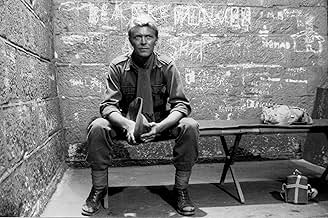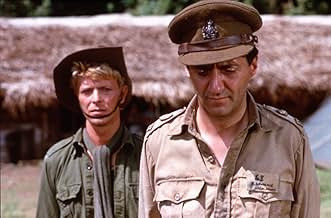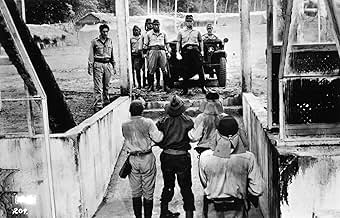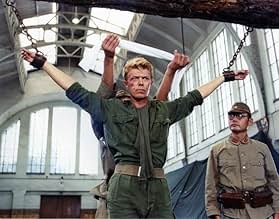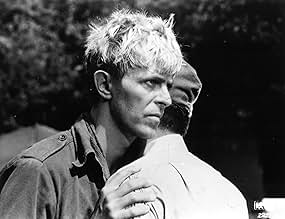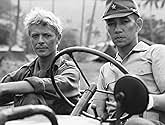Durante la seconda guerra mondiale, un colonnello britannico cerca di colmare le divisioni culturali tra un prigioniero di guerra britannico e il comandante del campo giapponese per evitare ... Leggi tuttoDurante la seconda guerra mondiale, un colonnello britannico cerca di colmare le divisioni culturali tra un prigioniero di guerra britannico e il comandante del campo giapponese per evitare spargimenti di sangue.Durante la seconda guerra mondiale, un colonnello britannico cerca di colmare le divisioni culturali tra un prigioniero di guerra britannico e il comandante del campo giapponese per evitare spargimenti di sangue.
- Regia
- Sceneggiatura
- Star
- Ha vinto 1 BAFTA Award
- 10 vittorie e 8 candidature totali
- Hara
- (as Takeshi)
- Kanemoto
- (as Johnny Ohkura)
- Commandant of Military Prison
- (as Yuya Uchida)
- President of the Court
- (as Ryunosuke Kaneda)
- Lieutenant Iwata
- (as Takashi Naito)
- Interpreter
- (as Rokko Toura)
- PFC Yajima
- (as Yuji Honma)
Recensioni in evidenza
To fully appreciate MCMR, try to understand the culture of both the captors and the prisoners at the time. To the prisoners, their existence in the camp is an unfortunate result of war, and should be temporary and not a life or death experience. To the Japanese captors, the prisoners who surrendered rather than died fighting are cowards, beneath the notice of the captors and likely not even viewed as human beings. They are expendable. But first, in this particular camp, there is an effort to "educate" the prisoners about the way a *true* warrior lives life (and dies). That is where the true conflict begins.
There are multiple physical and psychological struggles going on in MCMR. There is even some homoeroticism, though it isn't fully explained. There is certainly a lot of sadness, for characters on both sides. This point is brought home at the end, when the roles are reversed for two of the characters.
Even today, I can hum several parts of the score to MCMR, and they make me melancholy as I recall scenes from the movie. If you like movies that delve into the darker side of the human spirit (with some lightness thrown in), check out MCML. I rated it an 8.
Sakamoto, who is also a pioneer of electronic music with the Yellow Magic Orchestra, also wrote the soundtrack, including the famous "Forbidden Colours" theme (you probably know this even if you don't know where it's from) which conjures up the atmosphere of regret, lost love and repressed heartbreak in which we see the strange, unrequited love of Sakamoto's character for Bowie's. This film is about this impossible unrequited love and about the struggle of human values in wartime. As Lawrence (Conti) says to a Japanese Officer facing execution after the war; he is now the victim of "men who are sure they are right", just as in the camp the Japanese were sure they were right. The last scene between the decent, humane Lawrence and this officer, who was by turns hearty and brutal in the camp, is one of the most heartbreaking ever committed to celluloid.
These are four compelling characters. Tom Conti is solid. Ryuichi Sakamoto is interesting. Takeshi Kitano is absolutely brilliant. David Bowie delivers a mercurial performance. I want the plot to be bigger and more intense. It's also a bit long and meanders in the second half. I do love the final scenes with Hara and Lawrence.
This film is memorable because of a tremendous cast (including Jack Thompson- who keeps popping up in war movies) and a wonderful soundtrack by Ryuichi Sakamoto, who also performs in the movie. The soundtrack captures the jungle feeling, coupled with Japanese moods. Forbidden colours (song) has been known to give me goosebumps.
Very much, not your average War movie, _Merry Christmas Mister Lawrence_ is excellent because it portrays the relationship between captor and captive, victor and defeated. It's a movie about human spirit and love under dangerous circumstances! It's a movie about discipline and honour, especially the different way these are perceived.
The story sets in Indonesia in the second world war, and tells the tale of a couple of British soldiers out in a Japanese camp for prisoners of war.
It gives us insight between the raging camp of the British soldiers with their Japanses guards. It tells the tale of prisoner Mayor Jack Celliers, a rebellious and confronting individual. It tells the tale of Prisoner Kolonel John Lawrence, who tries to build bridges between the two cultures who collide ever so often. It tells the tale of prison camp leader Captain Yonoi, who makes an effort in running things smoothly with understanding for his prisoners, but who, by the arrival of Mayor Jack Celliers, is being pressured, and discovers a whole new side of emotional understanding. It tells the tale of ward Seargant Hara, who doesn't seem to want to understand the prisoners, and would rather execute them than have them here.
Those 4 main characters come to interact with each other in very interesting ways, and the whole story rises to a dramatic climax which leaves it's impact.
The first degree acting makes this one of the most important things to watch this movie. Both British music legend David Bowie (As Jack Celliers) as well as Japanese music sensation Ryuichi Sakamoto (as Captain Yonoi) both have the lead in this epic picture. For Bowie it isn't this first time he appears on the big screen (The man who fell to earth, The Hunger),but it can be said that this is the role for which he will be remembered. Debuting here, Ryuichi Sakamoto plays the arrogant, and piped down captain Yonoi, and he doesn't make a bad figure with this. Truth is both musicians play very good, but the best parts are for debuting (at the time) comedian Takeshi Kitano (Srgt. Hara Ginko, and stage actor Tom Conti (John Lawrence) who steal the show. Conti's uptight and friendly character gives a lot of sympathetic gestures from the audience, and Takeshi has both the laughs and cry's (Watch the final scene) at his hand, for playing such a funny bastard.
Nagisa Oshima's direction is strong, and he leaves room for artistic influence for both cast and crew. He knows what he wants too show, and doesn't make the mistake of being to dramatic, or being to soft, on crimes that his fellow country committed in 1945. He stays realistic which works as a pro for this film.
The cinematography is beautiful, as well as the set and surroundings, but mostly, it is the score, the music, written by Sakamoto which leaves the most impression. A big plus, on all fronts and a absolute classic in it's genre. A must have and must see.
Lo sapevi?
- QuizAccording to David Bowie, Nagisa Ôshima directed the Japanese actors with great detail. But when it came to the British actors, they were told to "do whatever it is you people do".
- BlooperIn the final scene in the prison cell, the cross belt of Lt Col Lawrence's Sam Browne is fitted back to front.
- Citazioni
Col. John Lawrence: You are the victim of men who think they are right... Just as one day you and captain Yonoi believed absolutely that you were right. And the truth is of course that nobody is right...
- ConnessioniFeatured in David Sylvian & Ryuichi Sakamoto: Forbidden Colours (1983)
- Colonne sonoreRide, Ride, Ride (Celliers' Brother's Song)
Composed by Stephen McCurdy
I più visti
- How long is Merry Christmas Mr. Lawrence?Powered by Alexa
Dettagli
- Data di uscita
- Paesi di origine
- Lingue
- Celebre anche come
- Merry Christmas Mr. Lawrence
- Luoghi delle riprese
- Rarotonga, Isole Cook(prisoners camp in Java)
- Aziende produttrici
- Vedi altri crediti dell’azienda su IMDbPro
Botteghino
- Lordo Stati Uniti e Canada
- 2.306.560 USD
- Fine settimana di apertura Stati Uniti e Canada
- 99.221 USD
- 28 ago 1983
- Lordo in tutto il mondo
- 2.376.612 USD
- Tempo di esecuzione
- 2h 3min(123 min)
- Colore
- Mix di suoni
- Proporzioni
- 1.85 : 1


